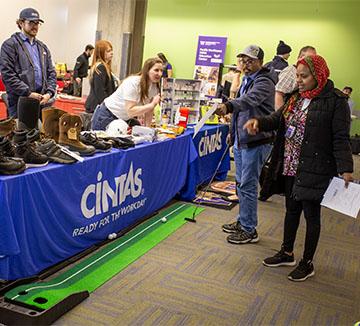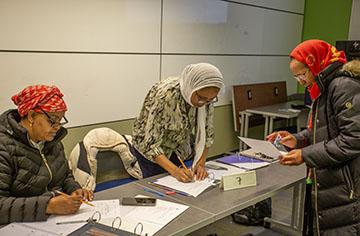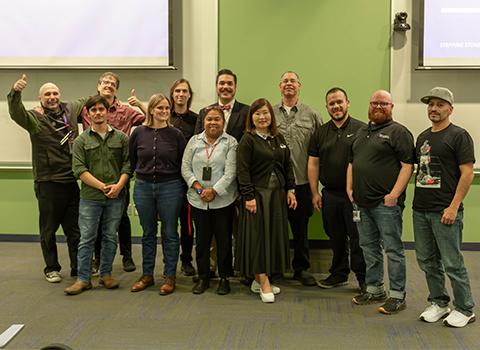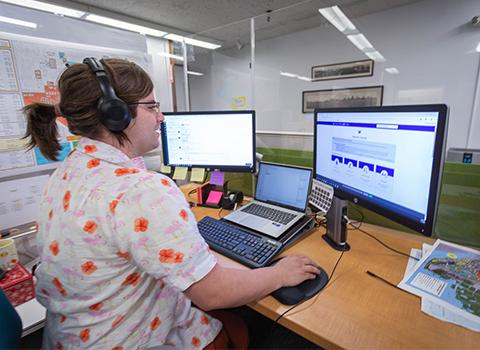English course widens opportunities for custodians
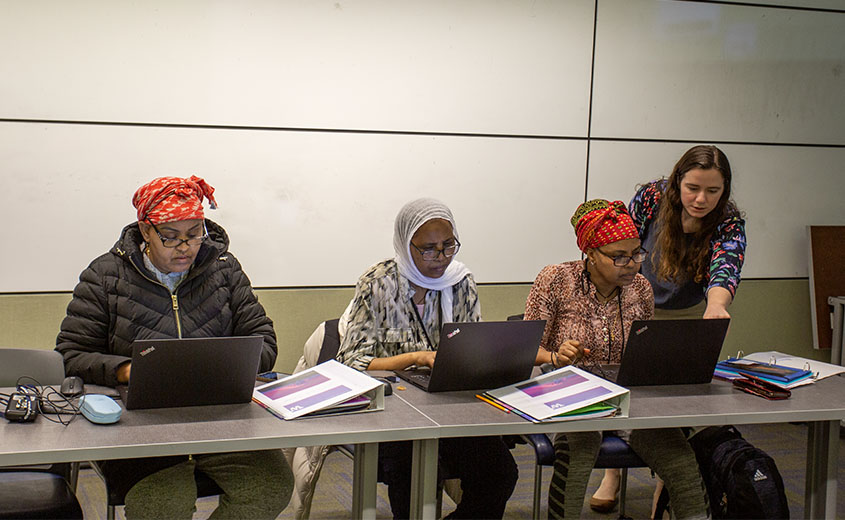
Custodians Dehab Seare, Teberh Derar and Hanna Eyasu practice using computers as part of the class English in the Workplace. Instructor Laura Kalmanson of Literacy Source offers help. Misty Shock Rule/University of Washington
Kye Lee, a UW custodian at the Physics/Astronomy Building, began his journey learning English almost 60 years ago, as a schoolboy in South Korea. Like many students who learn from textbooks, his reading comprehension skills were good, but he had trouble with speaking and pronunciation. By the time he moved to the United States, he was 50, a hard age to acquire a second language.
Now Lee is getting the chance to improve his English thanks to a course for custodians in UW Facilities’ Building Services Department (BSD) called English in the Workplace.
“I'm one of the UW community members. I'm proud of that,” Lee said. “This is surely a heavenly job for me — especially English in the Workplace."
The class, offered on a quarterly basis, teaches language skills contextualized around scenarios and topics custodians encounter on the job. The lessons are interactive, with students helping shape the curriculum.
BSD started this new version of English in the Workplace in autumn 2023 after custodians asked for it at departmental listening sessions. Many of BSD’s 280 custodians are immigrants who don’t speak English as their first language. As a group, they speak more than 24 languages, with Tigrinya, Korean and Amharic the most commonly spoken after English. There is room for 20 students each quarter, and 42 have participated so far this year.
BSD staff and leadership see the English course as an important professional development opportunity.
“Working here is more than just a job. We hope our team members feel a sense of connection and value,” said BSD Associate Director Amanda Solonika. “Most benefits and opportunities for employees require a strong understanding of English, so this class is the perfect place for BSD to start.”
Lee said that now, when he meets his manager in the hall, he asks him questions — significant for someone who hasn’t always felt comfortable speaking English.
“[The class is] very good for confidence,” he said. “I want to make conversation. Any time possible, there’s conversation.”
Driven by students, using real-life work scenarios
Driven by students, using real-life work scenarios
BSD offered a similar course for 20 years, but it was halted during the pandemic. That course was more conventional, with a set curriculum. With English in the Workplace, students decide what they will learn. On the first day of class, the instructor, Laura Kalmanson of Literacy Source, came to class prepared to talk about one set of topics.
But the custodians told her they wanted something different. She ended up teaching lessons on asking clarifying questions and polite language, subtleties that show just how complex the English language can be for a non-native speaker.
“A lot of people are coming from places where there's a lot of hierarchy in the language, so they want to address everyone as ‘sir’ or ‘ma'am,’” Kalmanson said. “When is that appropriate to do? And what’s the level of appropriateness between ‘Can you do this, could you do this, would you please do this’ — and just that super indirect crazy English.”
Lessons are interactive instead of relying on rote memorization. The custodians learned about the Family and Medical Leave Act. Then someone from Human Resources came to class, and students asked questions. There was a unit on safety hazards, a topic custodians already know a lot about. They ran dialogues where they got practice using past tense to describe something that had happened in a safety hazard scenario.
Often, the lessons are based on what’s going on in their jobs at the moment. UW Facilities held an All-Hands meeting in March. Students prepped for the meeting and later discussed unfamiliar words they heard. In another instance, they learned about Personal Protective Equipment (PPE) and then used that knowledge while visiting a PPE Open House hosted by UW Facilities’ Safety group in April.
The class culture is collaborative, with some students pairing up. Those who have strong English skills learn by helping someone else, while their partner benefits from the assistance. Custodians may start the term sitting by people in their work area, but by the end, they mix and do activities together.
“You can tell very quickly if a class is relevant or not,” Kalmanson said. “Students are very interested in this class. Almost every single class, everybody's paying attention. Everybody's asking questions. They're helping each other. They're asking each other questions.”
English in the Workplace has been recognized with a Diversity and Inclusion Seed Grant from the UW Office of Minority Affairs & Diversity, which will offset program costs for autumn 2024.
Growing confidence, better communication
Growing confidence, better communication
Kalmanson said students’ skill levels are high for English language learners, especially their speaking skills, which they need for their jobs. But they don’t feel confident because they compare themselves to native speakers.
Evaluations show English in the Workplace is helping with that. Students do a self-evaluation at the beginning and end of each quarter, where they are asked how confident they feel talking to their supervisor or customers. For the two quarters the class has existed, custodians reported feeling more confident.
The custodians spoken to for this story shared how the class has helped them at work. They said they appreciate that it’s offered as part of the job, unlike courses at community colleges and other venues outside of work.
"We didn’t have the chance to go to school back home. And then when we come here, we want to help our family. We just go straight to work. But now, this time is for us to learn. I always tell my kids, I'm going to UW!"
— Dehab Seare
"English is important, because it is my life,” said Hanna Eyasu, a custodian who works at the Paul G. Allen Center for Computer Science & Engineering. “When I work, I have to speak English. When I write, I have to write in English. If I live in America, I have to speak English.”
For example, Eyasu said, the PPE lessons were helpful because it’s a topic that comes up at her team’s monthly meetings.
BSD leaders are seeing the difference, too. Solonika said one student asked a question about insurance benefits, a topic even native speakers struggle to understand. Not only did that show how the student’s confidence had grown, but everybody learned while finding the answer.
For some custodians, English in the Workplace gives them an opportunity for education they didn’t get growing up.
"We're so happy when we come in with our backpack, you know? We go to school," said Dehab Seare, a custodian who works with Eyasu at the Allen Center.
"We didn’t have the chance to go to school back home. And then when we come here, we want to help our family. We just go straight to work. But now, this time is for us to learn. I always tell my kids, I'm going to UW!"
